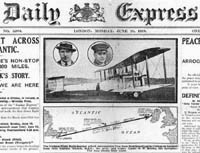 The Daily Express (London, UK)
The Daily Express (London, UK)

16 June 1919
The Daily Express was launched on 24 April 1900 by Cyril Arthur Pearson, a media baron whose empire came to include Pearson's Weekly (est. 1890), Pearson's Magazine (est. 1896), M.A.P. (Mainly About People) (est. 1897), The Royal Magazine (est. 1898), and The Novel Magazine (est. 1905) as well as The St James's Gazette, The Standard, and The Evening Standard. In September 1900, The Daily Express absorbed the halfpenny London Morning Herald (est. 1892), the first paper in Britain to put news, rather than adverts, on the front page, and its circulation was to rise from 270,000 in 1908 to 1,690,000 in 1930. Priced at halfpence (from 1918, one pence), it was edited by Pearson himself between 1900 and 1902, and by Ralph Blumenfeld, one of several Americans on the staff, between 1902 and 1929.
In its fervent support for empire, hostility to Germany, and goal of forging a distinct cultural identity for its increasingly suburban readership, The Daily Express closely followed Alfred Harmsworth's rival Daily Mail. In accordance with Pearson's axiom, 'Never forget the cabman's wife', it packaged the news with pictures, women's sections, gossip columns, social pages, and serial fiction. Blumenfeld directed his staff to write concise sentences of short words using 'must' and 'will' for emphasis, and introduced American-style multi-deck headlines that provided telegraphic summaries of news items. Other innovations included the banner headline, the crossword, and the abandoning of full stops or periods in headlines.
Pearson's guarantee that The Daily Express would be 'the organ of no political party nor the instrument of any social clique' lasted until 1912, when it fell under the control of Max Aitken, an opportunistic Canadian businessman and Conservative parliamentarian who used its pages to pursue hobby-horses such as Empire Free Trade. 'I ran the paper purely for propaganda', he later declared. After becoming its formal owner in 1916, Aitken, now Lord Beaverbrook, invested 200,000 pounds to make the paper profitable by 1922. In 1919, he launched The Sunday Express.
The sinking of RMS Empress of Ireland in a collision at sea on 29 May 1914 spurred Conrad to write an essay proposing the use of cork fenders. Published in The Illustrated London News and, in extracted form, in The Globe on 6 June, it prompted a number of letters to the press, including to The Daily Express. Conrad responded to discussion of his proposal in a letter to The Daily Express of 10 June, subsequently collected as a supplement to his essay, and in another letter published in The Globe on 13 June.
Sources
Brendon, Piers. The Life and Death of the Press Barons. London: Secker and Warburg, 1982.
Conrad, Joseph. Notes on Life and Letters. Ed. Stape, J.H., with Andrew Busza. Cambridge: Cambridge University Press, 2004. See Appendix C: Correspondence about the Empress of Ireland.
Cunningham, John. 'National Daily Newspapers and Their Circulations in the UK, 1908-1978'. Journal of Marketing History 4 (1981): 16-20.
Curran, James. 'Capitalism and Control of the Press, 1800-1975'. Mass Communication and Society. James Curran, Michael Gurevitch, and Janet Woollacott. London: Edward Arnold, 1977.
Engel, Matthew. Tickle the Public: One Hundred Years of the Popular Press. London: Victor Gollancz, 1996.
Griffith, Dennis, ed. The Encyclopedia of the British Press, 1422-1992. London: St. Martin's Press, 1992.
Hutt, Allen. The Changing Newspaper: Typographic Trends in Britain and America 1622-1972. London: Gordon Fraser, 1973.
Jones, Kennedy. Fleet Street & Downing Street. London: Hutchinson and Co, 1920.
Koss, Stephen. The Rise and Fall of the Politicial Press in Britain: Volume I: The Nineteenth Century. London: Hamish Hamilton, 1981.
Richards, Huw. The Bloody Circus: The 'Daily Herald' and the Left. London: Pluto Press, 1997.
Weiner, Joel. H. 'The Americanization of the British Press, 1830-1914'. Studies in Newspaper and Periodical History: 1994 Annual. Ed. Michael Harris and Tom O'Malley. Westport, Connecticut: Greenwood Press, 1994. 61-74.